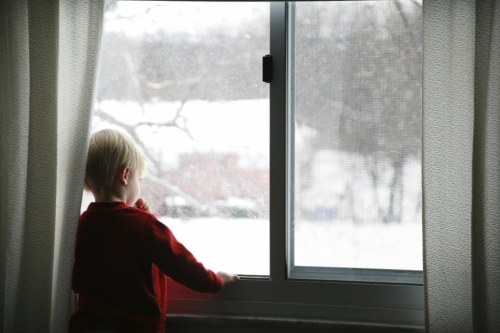Indoor Air Quality Plays a Role in Your Family’s Health
Sep 29, 2014

According to the U.S. Environmental Protection Agency (EPA) indoor air is two to five times more polluted than the air outside. Living in a home with poor air quality puts your family at risk of serious health repercussions. Indoor pollution also impacts your comfort level, household operating costs and even the structure itself. It’s vital to learn more about the causes and negative effects of poor indoor air quality so you can take the steps necessary to protect your home and family.
What Makes Indoor Air Go Bad?
Polluted air inside a home can contain a cocktail of unhealthy allergens, poisonous gases, biological contaminants and harmful particles from a variety of sources, such as:
- Exhaust fumes from fuel-burning appliances and equipment that contain harmful nitrogen dioxide (NO2) and lethal carbon monoxide (CO).
- Hazardous volatile organic compounds (VOCs) from carpet, paint. furnishings and building materials.
- Allergy-inducing particles such as plant pollen, pet dander and dust mites.
- Toxic chemicals released into the air from the many maintenance, laundry, cleaning and personal care products used and stored in a home.
- Mold, mildew, bacteria and viruses that flourish in a warm, humid environment.
- Cancer-causing radon gas present in the soil under a home that seeps in through cracks in the foundation.
How Indoor Pollution Impacts Health
Exposure to contaminated air can cause symptoms such as nasal congestion, sore throats, itchy or watering eyes, chest congestion and coughing. Unexplained complaints including headaches, fevers, nausea, nosebleeds, fatigue and upper respiratory infections can also be attributed to poor indoor air quality. High levels of pollutants and/or long-term exposure can worsen existing health problems and cause serious or life-threatening illnesses, such as:
- Chronic bronchitis
- Allergic reactions
- Asthma
- Multiple chemical sensitivity (MCS)
- Heart disease
- Lung disease
- Carbon monoxide (CO) poisoning
- Lung and other forms of cancer
Additional Negative Effects of Poor Indoor Air Quality
When air quality issues in your home aren’t addressed, they can impact your day-to-day life in various ways including:
- Higher energy bills – If the airborne particles circulating through your HVAC system block the air filter, crucial airflow declines. When there’s less-than-adequate airflow, the equipment consumes more energy, and your utility bills increase.
- HVAC equipment damage – Restricted airflow puts extra strain on the equipment, and a clogged air filter allows pollutant particles to build up within the system. These two factors can lead to the premature failure of various system components.
- Decreased comfort – When excessive amounts of pollutants plug up the filter and impair proper airflow, the HVAC equipment isn’t able to remove moisture effectively. High humidity makes a home uncomfortably hot and sticky during the cooling season, and offensive musty odors can develop.
- Structural deterioration – When humidity is excessive, water stains start to appear on ceilings and walls. Paint begins to peel, and wood trim and floors warp and buckle. Warmth and humidity also create the ideal conditions for the mold and mildew growth that can deteriorate organic surfaces.
Effective Solutions for a Poor Indoor Air Quality Issue
There are a number of steps you can take to improve the quality of the air in your home:
- Boost air exchange – Open windows whenever possible. For a year-round source of clean, fresh air, consider adding whole-house mechanical ventilation to the HVAC system.
- Decrease humidity – If the A/C isn’t removing humidity effectively, have it professionally inspected to ensure it’s sized correctly. You may need to supplement it by having a dehumidifier installed on the HVAC system. During heating season, run bathroom and kitchen exhaust fans to remove moisture from bathing, showering and cooking.
- Increase air filtration – Replace the HVAC air filter monthly to help control allergens. Talk to your HVAC specialist about what system modification are involved in switching to high-efficiency particulate air (HEPA) filters for more effective filtration.
- Maintain all fuel-burning equipment – Have yearly maintenance performed on all combustion devices, including the gas furnace, range, dryer and water heater. This ensures that they’re operating safely and efficiently so there’s less risk of exposure to harmful exhaust fumes.
- Limit VOC off-gassing – Only purchase low-VOC or environmentally-friendly household products and furnishings. If you must buy items containing VOCs, purchase the smallest amounts possible and avoid storing them for extended periods.
- Check for radon – Schedule a professional test or buy a do-it-yourself kit. If radon is present, you can hire an experienced professional to remove the threat.
If you are concerned that poor indoor air quality is negatively affecting your Longview area home and you need expert advice, contact us, the professionals at JD’s A/C. for your Indoor Air Quality evaluation.
